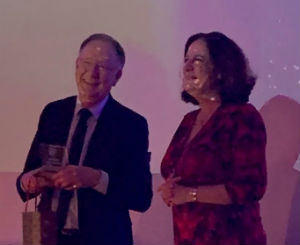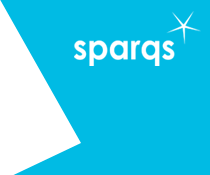
In this interview, we talk to Professor Norman Sharp OBE, who stepped down at the sparqs’ 2019 conference as chair of our Trustees (pictured right, receiving an Award at #sparqs19 to thank him and mark his invaluable contribution to sparqs over the last eight years). Norman has a distinguished track record of work in higher education, and as Director of QAA Scotland (1997-2009) was responsible for the development of Scottish Higher Education’s Quality Enhancement Framework which directly led to the creation of sparqs. He has undertaken consultancy with higher education sectors across the world, and has served on a number of University Courts. He was awarded an OBE for services to higher education in 2006.
1. Can we start with your work at QAA Scotland. What do you recall of the early discussions about creating the Quality Enhancement Framework in 2002, and how did student engagement become a part of those plans?
When we were looking at developing a new national quality system, we knew that the new regime had to be focused on teaching and learning and the overall quality of the student experience, while avoiding all unnecessary bureaucracy. I thought that we should go back to first principles and ask ourselves, ‘who are the key players in all of this?’. There was the agency (QAA), the sector, and there were, most importantly, the students. I convened a very informal working group, comprised of QAA, the Scottish Funding Council and the NUS Scotland President. The students thus became insiders from the start, not outsiders.
At the outset, we agreed to do some homework – I didn’t want anyone to read anything on quality assurance but instead, I wanted them to go back to the basic literature about how students learn in higher education and think about what the evidence tells us about the factors affecting the quality of the student learning experience. When you look at the research around learning and teaching, the big words that jump out at you are ‘active participation’. From that very simple foundation, it was very clear that this whole quality process couldn’t be something that was ‘done’ to the university or its students. It had to be something in which everyone contributed to shaping it and everyone participated in running it in their own way within an agreed framework
One of the founding principles of the Quality Enhancement Framework was therefore that quality and standards have to be owned by institutions and their students. Institutions and students have to be at least as passionate about safeguarding the standards of their own (and their institution’s and their country’s) degrees as anyone else: they’re the ones that fight for high standards; students are in the lecture theatres and the laboratories every day of the week; they’re the ones that know when standards or quality are slipping. These are the folk who are the serious owners of quality. The emerging quality framework therefore focused on where the real ownership of quality and standards lies, and the serious interest these ‘owners’ have in enhancing the quality of student learning and safeguarding the standards of their awards.
2. And why did that require an agency like sparqs? How did sparqs come into the equation in those discussions?
We agreed that there needed to be a body that students felt ownership of and that would always be the champion of students’ participation in quality matters. Seriously engaging students in participating in quality matters was a big ask. Effective participation at programme, institutional or, indeed, national level requires an effective mechanism to sustain ongoing training and support for students: a body which would champion, lead and support the students in the quality arena. sparqs was therefore created to take up this key challenge – not to work in isolation, but to work in partnership with the other agencies and bodies involved. This partnership approach remains the hallmark of how sparqs works.
3. Has student engagement and sparqs evolved in Scotland since those early days in the way that you imagined? Did indeed anyone have a vision for the direction it should go, or was it felt that through sparqs and others involved in student engagement, it would forge its own path?
sparqs has now evolved in a way that surpasses my expectations. It is undoubtedly, and I say this with knowledge, leading the world. We’re in a different place from what happens elsewhere. Some countries are, I’m pleased to say, learning from us. Ireland and Iceland are good examples of countries on their own journeys learning from the philosophy and practice of sparqs. These international engagements are also extremely important in helping sparqs to continually reflect on and improve its own practice. What has emerged now in sparqs is a sophisticated framework of support for student engagement in quality matters at all levels within colleges and universities and also at the national level. I think it was important for sparqs to be given its time to mature: this was a novel venture with little experience anywhere from which to learn. This has allowed sparqs, with its partners, to develop and flourish into its current form with its strong and clear sense of strategy and outstanding delivery. All involved are to be hugely congratulated.
4. Where do you think we go next? What is the future for the concept and practice of student engagement?
We cannot rest on our laurels. There are corners where student engagement can still be improved and always new forms and structures of education emerging. The key challenge is sustaining this hard work. The student population is constantly changing and being renewed. Moreover, the context in which students are learning is changing, and that poses challenges: how do you support students learning at a distance? As technology-based learning is increasingly introduced, how can we support students in contributing to the management of quality? As market pressures continue to take their toll, how does this affect the role of students in managing quality? Diversity across the sector brings with it a diversity of challenges. Developing technology of teaching and learning, and increasing individualisation of learning: all of these pose significant challenges. And that’s only within institutions. There are also challenges to be faced in the changing interfaces between post-compulsory institutions and schools, and institutions and the growing opportunities for work-based learning. We will not be short of future challenges: but we are building on a very, very firm foundation.
We always need to continue ensuring that students are not appointed to key roles just to say the right thing or to fill a slot to meet requirements. We’ve got to make sure that there are structures in place at the institution where the students have a strong and well-informed constructive voice. We must also make sure that student representatives continue to be well trained for their roles. These challenges continue, but in an increasingly complex environment. If you have a quality model with effective student participation as a foundation pillar it will have a high probability of success: the student learning experience will be continuously enhanced and the standards of their awards secured.
To my mind, this all comes back to the oft misattributed quote that “education is about the lighting of fires, not the filling of pails”.
.
Thanks to Norman for being an interviewee. To suggest a future subject for interview, please contact us.
This interview is part of a series of occasional interviews on our website with student engagement practitioners – both staff and students, and from within Scotland’s university and college sector and beyond. The interviews aim to capture the different perspectives that people have on student engagement in the quality of learning.


